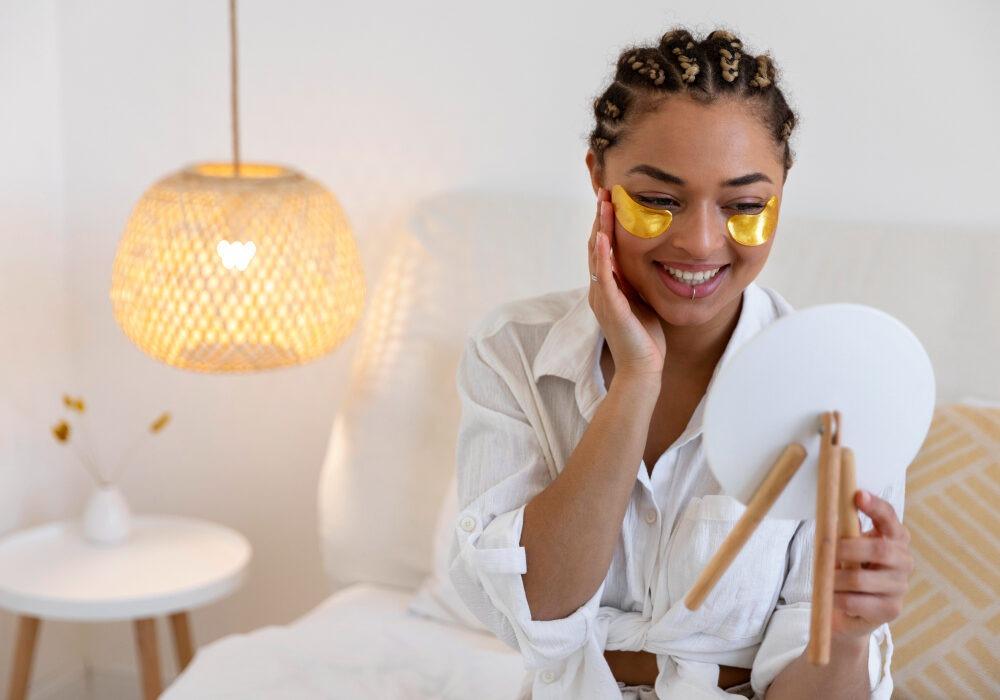In the fiercely competitive world of skincare, great marketing strategies for brands are the key to success. With the rise of social media and influencer culture, the way we discover and engage with beauty brands has undergone a monumental shift.
While high-quality products are essential, a brand’s ability to tell a compelling story and connect with its audience on a personal level is what sets it apart. We will dive into the marketing strategies of 9 skincare brands that have captured the attention of beauty enthusiasts worldwide.
Why Should Skincare Brands Have a Strong Marketing Strategy?
The beauty industry is becoming more and more saturated today. With countless products available, a strong marketing strategy is more than just necessary. It is a critical lifeline.
Marketing not only helps to communicate a brand’s message and values but also connects emotionally with consumers.
Strategic marketing helps skincare brands highlight their unique selling proposition and demonstrate their understanding of customer needs and lifestyle aspirations.
A powerful marketing approach allows a brand to:
- build trust,
- create meaningful engagements,
- encourage brand loyalty,
- And, ultimately, drive sales.
As consumers make more informed and value-driven choices, marketing provides a platform for skincare brands to educate and inspire their audience.
That’s why investing in a marketing strategy isn’t just about reaching customers; it’s about creating a long-term relationship with them.
Read: 7 Small Business Marketing Trends to Watch Out For 2024
9 Skincare Brands With Impactful Marketing Strategies
Here are 9 brands that have proven their strong marketing strategy for skincare brands.
1. La Roche-Posay: The Sensitive Skin Experts
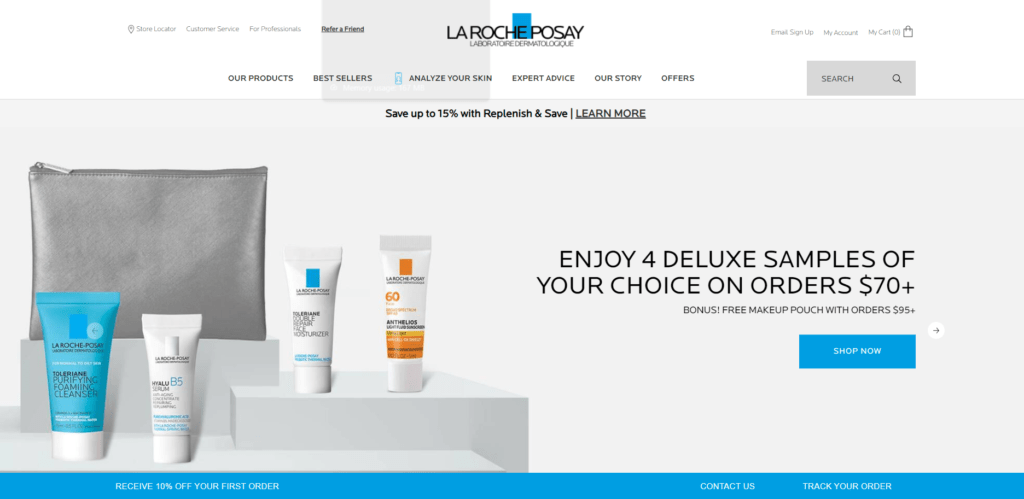
La Roche-Posay has successfully embedded itself as the authority in sensitive skin care through its commitment to dermatological efficacy and minimalist formulations. Furthermore, the brand fosters trust by partnering with healthcare professionals who recommend their products, which often become the top choice for consumers with delicate skin needs.
The brand’s marketing approach is highly educational, often featuring dermatologists in their content to provide expert advice and dismiss skincare myths.
Their social responsibility is essential to their brand image. They also actively promote initiatives that support the environment and are certified by organizations like the National Eczema Association. Also, La Roche-Posay uses these endorsements to build trust with consumers, proving its products are not just trendy but also highly effective.
One specific example of La Roche-Posay implementing its sensitive skin expertise in its marketing strategy can be seen in the launch of its Toleriane Ultra Cream campaign. Consequently, the company built a narrative around the product’s development, highlighting the collaboration with dermatologists and the rigorous clinical testing it underwent to ensure safety for even the most sensitive skin.
They used real-life case studies in their online and print materials, showcasing testimonials from individuals with sensitive skin who had seen marked improvements. Additionally, La Roche-Posay maintains an active and responsive presence on social media, where customers share their personal stories and results, further amplifying the brand’s narrative of transforming sensitive skin health.
This campaign not only educated potential customers about the unique advantages of the Toleriane Ultra Cream but also solidified La Roche-Posay’s reputation as a trustworthy brand for individuals with sensitive skin requirements.
2. CeraVe: Science-Backed Simplicity

CeraVe is another brand that’s made a massive impact in the skincare world with its no-nonsense, science-backed approach. What distinguishes CeraVe is its ownership of a few key ‘hero’ ingredients, such as ceramides and hyaluronic acid.
This has propelled them to a prominent position in the industry as a brand that’s dedicated to improving the overall skin health of its users. More so, their marketing capitalizes on this dedication, prominently featuring educational content that explains why these ingredients are beneficial.
One of CeraVe’s strongest marketing tools has been its accessibility, featuring simple, unisex packaging and affordable price points.
The brand has also leveraged its presence on social media, particularly reaching out to consumers via platforms like TikTok, where educational content is king. One specific campaign that showcases CeraVe’s strategic approach was their targeted content on TikTok.
Recognizing the platform’s potential to reach the coveted Gen Z audience, CeraVe partnered with skincare influencers to create a series of educational and engaging videos.
These videos highlighted their key ingredients and their benefits, demonstrating product use while emphasizing the science behind their formulations.
This partnership not only skyrocketed CeraVe’s brand presence among younger consumers but also translated into viral success, with hashtags related to the brand amassing millions of views and, consequently, a significant increase in product demand.
Read: How To Hire an Influencer to Market Your Business
3. Paula’s Choice: The Power of Transparency
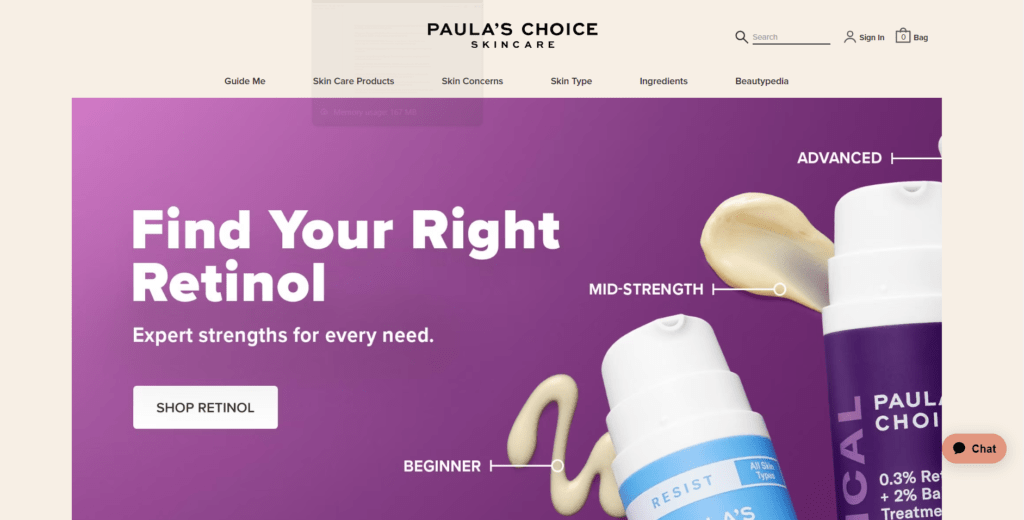
Paula’s Choice has disrupted the skincare market with its commitment to transparency and the science of skincare. Their unique selling proposition is the ‘Beautypedia,’ a robust platform that reviews and rates various beauty products, offering insights and transparency that consumers crave.
The brand’s marketing is built on the Paula Principle: the idea that marketing should be honest and products should be formulated according to scientific research. Therefore, their dedication to providing detailed ingredient lists and explanations sets them apart in an industry where many brands are less forthcoming.
An exemplary illustration of Paula’s Choice implementing its transparency strategy is found in its approach to the “Clinical Niacinamide 20% Treatment.” It does not only list niacinamide as a key ingredient but also provides an in-depth explanation of the benefits of niacinamide for different skin concerns, backed by scientific references.
Additionally, the brand shares before-and-after images of real customers, further validating the product’s effectiveness. This level of detail aligns with their overarching commitment to informed consumer choice and harnesses the power of education as a cornerstone of their marketing strategy.
4. Glow Recipe: Merging Korean Beauty with Global Appeal
Glow Recipe has mastered the art of merging K-beauty trends with a playful, fun, global appeal. Started by two Korean celebrities in the beauty industry, the brand’s fruit-powered formulations have become a staple for glowy, healthy skin.
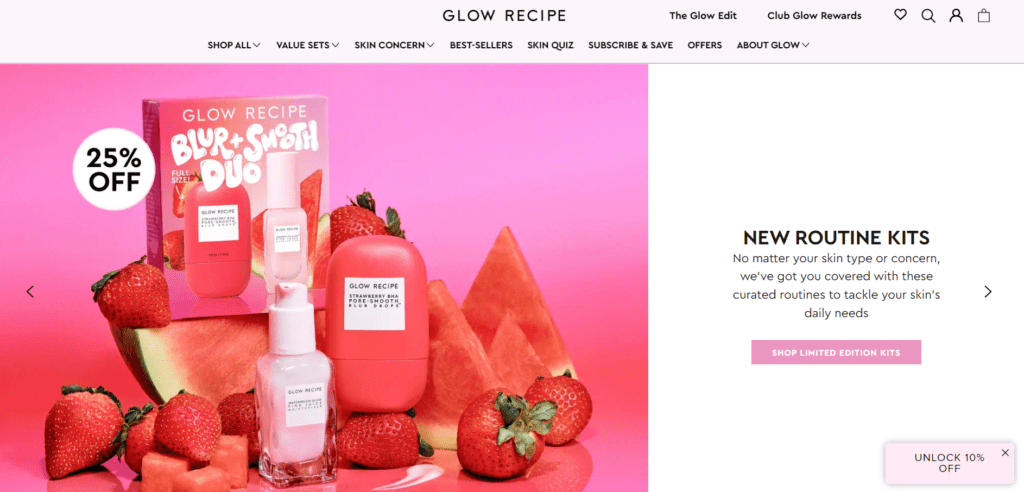
Glow Recipe’s marketing also emphasizes the sensory experience of skincare. They use vibrant visuals and descriptive language to highlight the textures and scents of their natural ingredients.
They have capitalized on the K-beauty trend’s rise to fame but have also gone beyond that to create a lifestyle associated with their brand.
Their social media is full of colorful, interactive campaigns that resonate with their primarily millennial and Gen Z audience. They frequently collaborate with well-known influencers, creating limited-edition products or pop-up shops, further cementing their place as trendsetters.
For instance, Glow Recipe’s strategic launch of the Watermelon Glow Sleeping Mask exemplifies their innovative approach. By infusing the product with watermelon—a much-loved fruit in both the skincare community and culinary spheres—they generated immense buzz.
This move not only leveraged the ingredient’s natural benefits for the skin but also tapped into a sensory experience for the consumer. The delightful fragrance and hydrating properties of their watermelon glow sleeping mask make it a best-seller within the Glow Recipe lineup.
The product was meticulously marketed through vividly engaging Instagram posts, stories, and partnerships with influencers, who demonstrated the mask’s use in their night-time routines.
Such tactics emphasized the brand’s core message of ‘fun meets function,’ and the mask quickly became a best-seller, with stocks selling out within hours of its release.
Read: 7 Small Business Marketing Trends to Watch Out For 2024
5. Cetaphil: Trusted by Dermatologists, Loved by Families

Cetaphil’s marketing success lies in its tagline, “Gentle Power That Everyone Loves.” They have long been celebrated for their gentle yet effective skincare solutions that cater to all skin types. This trust is reflected in the way families have consistently incorporated Cetaphil products into their daily routines.
The brand is synonymous with simplicity and effectiveness, and its marketing consistently reflects this. Therefore, they focus on the stories and testimonials of real people who have found relief for their skin problems by using Cetaphil products.
The brand’s marketing materials often feature people from all walks of life, making Cetaphil a trustworthy, universally loved product. They have also been successful at highlighting their award-winning products and the brand’s affiliations with leading dermatological academies.
An exemplary instance of Cetaphil’s strategy implementation is their “Gentle Skin Cleanser” campaign, where they utilized the power of user testimony to authenticate their ‘gentle yet effective’ brand promise.
They showcased a range of individuals, from babies to adults, with different skin types and concerns using the product, highlighting its suitability for the entire family. Additionally, Cetaphil partnered with dermatologists who recommended the cleanser, affirming its medical credibility.
This not only reinforced the brand’s reputation as dermatologist-trusted but also emphasized its mass appeal as a family-friendly product line.
Read: Unlock Social Media Success With Customer-Generated Content
6. Dior Beauty: The Art of Luxury Marketing
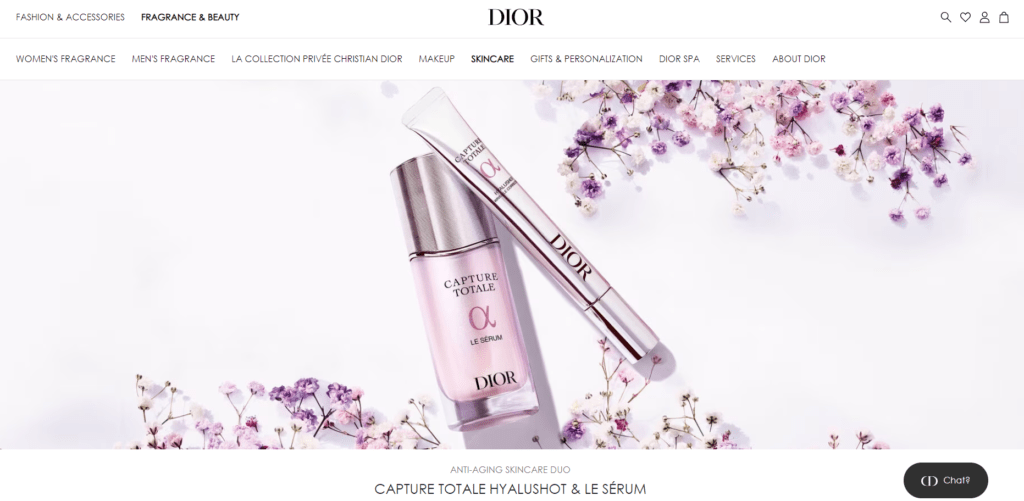
Dior Beauty effortlessly sells a lifestyle of luxury and sophistication. They understand their customer base well and market their products as part of a lifestyle that will elevate the consumer’s experience.
Dior Beauty’s marketing goes beyond product features. They also focus on creating an aspirational brand narrative that resonates with those seeking to embody elegance and haute couture in every aspect of their lives.
Their advertising campaigns often feature stunning visual arts and filmography, creating a sense of exclusivity and aspiration that its audience craves.
The brand is also not afraid to experiment with technology, often running AR (augmented reality) campaigns and social media filters that allow users to ‘try on’ their products virtually. This innovative use of technology not only enhances the customer experience but also reflects Dior Beauty’s commitment to adhere to cutting-edge innovation.
Dior Beauty’s commitment to quality, presented with a flair for the dramatic, continues to captivate consumers globally.
One specific example of Dior Beauty’s implementation of its luxury marketing strategy is its “Capture Totale Super Potent Serum” campaign. They launched an immersive online experience that allowed users to explore the benefits of the serum in a virtual laboratory.
With high-definition visuals and an elegant narrative, the campaign educates consumers on the serum’s revitalizing properties derived from natural ingredients. This initiative brings the art of luxury marketing into the digital era. It perfectly aligns with their sophisticated brand image and allows customers to visualize and virtually experience the product before making a purchase.
7. Rare Beauty: Redefining Beauty and Philanthropy
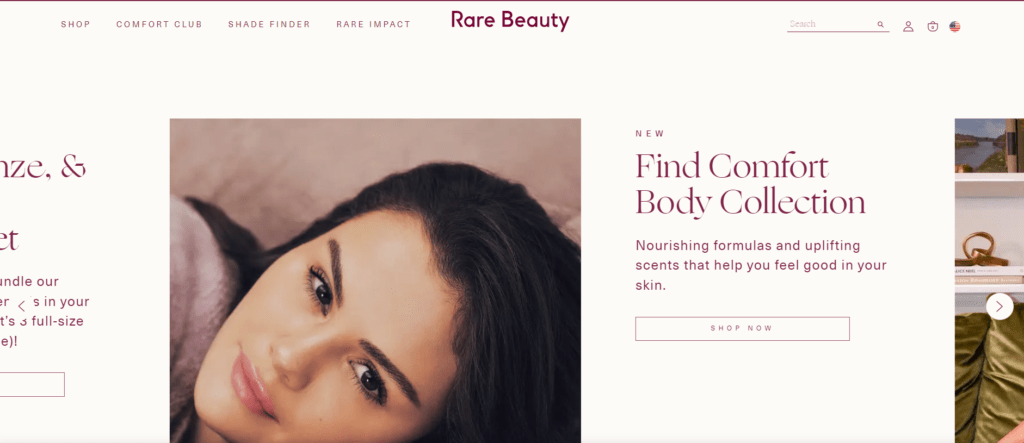
Rare Beauty, founded by singer and actress Selena Gomez, is about much more than just looking good. They quickly become known for their mission to challenge the impossible standards of perfection that transfuse the beauty industry.
The brand’s marketing strategy focuses on mental health awareness and inclusivity, reflecting its mission to break down unrealistic beauty standards. They use their social media not only to promote products but also to spark conversations about mental health and self-acceptance.
A notable component of Rare Beauty’s marketing is its ‘Rare Impact Fund,’ which pledges to raise $100 million over the next ten years to support mental health services. This philanthropic approach has resonated with audiences, particularly Gen Z and Millennials, who prioritize brands that stand for a cause.
Rare Beauty highlights its skincare line as part of a holistic approach to beauty that encourages consumers to feel good in their skin. Through innovative products and a powerful narrative, Rare Beauty emphasizes the beauty of authenticity and the importance of mental well-being.
A specific marketing initiative includes showcasing real customer testimonials and unretouched photos to emphasize genuine results and embrace natural beauty.
This strategy aligns with their broader message of self-acceptance and mental health advocacy, making it deeply resonant with a demographic that values transparency and ethical branding.
8. Cosrx: Online Community and Holistic Skincare

Cosrx has made a significant impact with its extensive line of K-beauty products and a strong focus on creating a total skincare routine. The brand has steadily built an online community around its philosophy of high-efficiency skincare. They engage customers through social media interactions, tutorial content, and real user feedback that highlights the effectiveness of its holistic approach.
The brand’s marketing is largely community-driven, with its loyal customer base actively participating in spreading the word through reviews, social media posts, and brand loyalty.
Cosrx is also part of the larger trend of holistic skincare, with marketing materials that often focus on a routine rather than individual products. Their straightforward and minimalist packaging reflects the simplicity at the core of their ‘less is more’ skincare approach.
Cosrx’s launch of the “Master Patch” line serves as a compelling example of the company’s strategy to engage with its online community and emphasize holistic skincare. The “Master Patch” collection not only addresses the immediate concern of blemishes but also aligns with Cosrx’s philosophy of maintaining skin health.
The brand harnessed the power of social sharing by encouraging customers to post their before-and-after pictures using the acne patches.
The transparency of real user experiences published across various social platforms provided authentic testimonials and drove the product’s reputation to viral status. Their skin-positive messaging and powerful user-generated content campaigns have also positioned them as a go-to brand for consumers seeking genuine product efficacy and a supportive community.
Moreover, in their marketing materials, Cosrx didn’t just promote the patches as a standalone quick fix but as a complementary addition to a comprehensive, skin-friendly routine, reinforcing their holistic skincare messaging.
Read: How to Use Social Analytics to Know What Works for Your Business
9. Estée Lauder: Tradition Meets Modernity
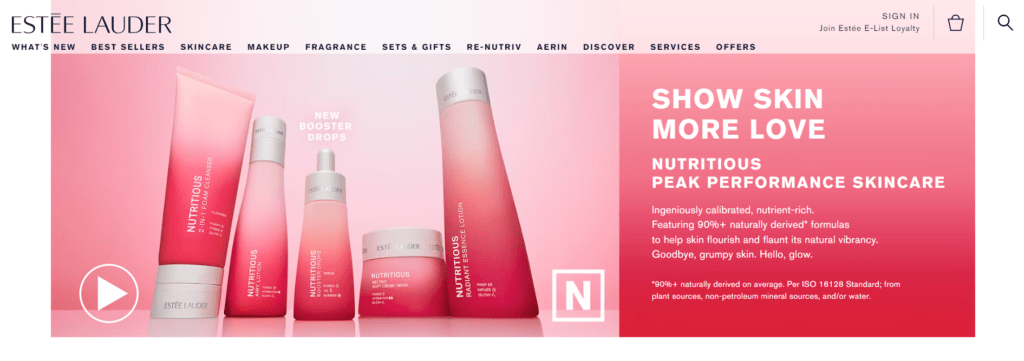
Estée Lauder has managed to stay relevant by blending tradition with a modern skincare marketing strategy. The brand uses digital tools and social media to appeal to a new generation of skincare enthusiasts while maintaining the trust of longtime customers.
The company uses a multifaceted approach, including social media, influencer partnerships, and events to target different demographics.
They are also known for their loyalty programs and personalized customer experiences, utilizing data to tailor their marketing to individual customer preferences. With their innovative step, the brand not only enriches customer experience but also expands its global reach in the digital beauty marketplace.
Estée Lauder’s approach acknowledges the growing trend of personalization in the beauty industry, and they continuously innovate to keep up with evolving consumer desires.
One specific and innovative example of Estée Lauder’s strategy in action is the personalized skincare consultation service offered through their website and at select counters. These consultations leverage advanced diagnostic technology to provide tailored product recommendations. It also ensures a skincare regimen that is as unique as each customer’s skin.
They implemented a digital beauty advisor tool named the “iMatch Virtual Skin Analysis,” which uses advanced technologies to analyze a customer’s skin concerns and recommend a tailored skincare regimen.
By answering a series of questions about their skin type, concerns, and preferences, customers receive a customized skincare routine that matches Estée Lauder products to their individual needs. This virtual tool exemplifies the company’s dedication to combining tradition with cutting-edge solutions to enhance customer experience and satisfaction.
Want to improve your brand strategy? Check out the video below for more details.
Conclusion: Great Marketing Strategies Are the Key to Success
Marketing is the lifeblood of any business. It’s not enough to have excellent products. Brands must also find unique ways to connect with their audience, differentiate themselves from competitors, and stand behind the values that resonate with consumers.
The success stories of these 9 skincare brands indicate that a strong marketing strategy is essential for carving out a niche in the competitive skincare market.
A common thread among these brands is authenticity and a genuine commitment to their stated values. They have achieved this through various mediums, whether it’s by educating their audience, promoting transparency, focusing on inclusivity, or providing a luxury experience.
In an industry that often feels saturated with the ‘next big thing,’ these brands showcase the power of a clear, consistent, and customer-centric marketing approach. These market leaders not only retain a sense of heritage but also create an evolving narrative that continues to draw and captivate a discerning, modern audience.
For budding beauty entrepreneurs and small business owners, the case studies of these innovative brands provide a valuable blueprint for success in the skincare marketplace.
Related: Are You Marketing To the Right Person? People Are Buying

